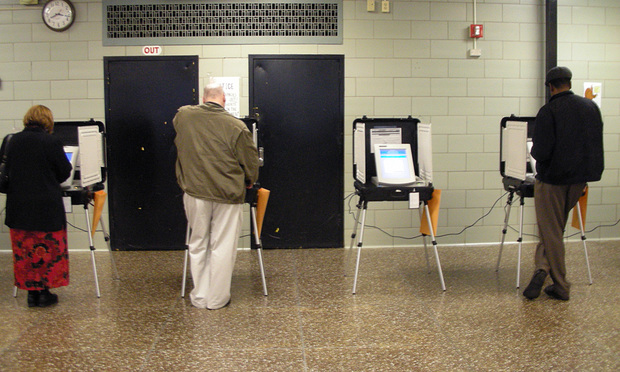Randolph County Elections Board Won't Close Polling Places
An independent consultant recommended Randolph County close them because they don't comply with the Americans with Disabilities Act. The county fired that consultant on Thursday.
August 24, 2018 at 10:03 AM
2 minute read
 (Photo: Diego M. Radzinschi/ALM)
(Photo: Diego M. Radzinschi/ALM)
Election officials in a majority black Georgia county voted Friday to scrap a widely condemned proposal to eliminate most of their polling places.
The elections board in Randolph County said concern about the proposal to close seven of nine voting locations in the rural county was “overwhelming” and is “an encouraging reminder that protecting the right to vote remains a fundamental American principle.”
Black voters said they'd be disenfranchised by the plan to shutter the voting locations, which were just used in this year's primaries.
An independent consultant recommended their closure because they don't comply with the Americans with Disabilities Act. The county fired that consultant on Thursday.
Opponents questioned why a county would make it harder to vote during the hotly contested race for governor. Georgia's top elections official, Republican Brian Kemp, is running against Democrat Stacey Abrams, who would become Georgia's first black governor. Both said they oppose the plan.
The polling places in question had all been used for the primary election in May and the primary runoff election in July, and officials should have been aware of ADA compliance issues. Randolph County and the Department of Justice entered a settlement agreement in 2012 promising to fix the violations in three years. The settlement specifically included a section on polling place compliance. Aside from a grant used to fix issues in the courthouse, the updates didn't happen, county attorney Tommy Coleman said.
Civil rights groups had protested the plan. The circumstances surrounding the proposal leave “a reasonable observer to wonder whether the real motive behind these closures is indeed to make it harder for African Americans to cast a ballot,” American Civil Liberties Union of Georgia attorney Sean Young said in a letter sent to county officials Aug. 14.
The NAACP Legal Defense and Educational Fund and the ACLU of Georgia sent a joint letter Wednesday to election officials in all 159 Georgia counties, urging them to avoid polling place changes that could disenfranchise voters.
This content has been archived. It is available through our partners, LexisNexis® and Bloomberg Law.
To view this content, please continue to their sites.
Not a Lexis Subscriber?
Subscribe Now
Not a Bloomberg Law Subscriber?
Subscribe Now
NOT FOR REPRINT
© 2025 ALM Global, LLC, All Rights Reserved. Request academic re-use from www.copyright.com. All other uses, submit a request to [email protected]. For more information visit Asset & Logo Licensing.
You Might Like
View All
Transgender Care Fight Targets More Adults as Georgia, Other States Weigh Laws

Georgia Republicans Push to Limit Lawsuits. But Would That Keep Insurance Rates From Rising?
5 minute read
A Plan Is Brewing to Limit Big-Dollar Suits in Georgia—and Lawyers Have Mixed Feelings
10 minute readTrending Stories
- 1DeepSeek Isn’t Yet Impacting Legal Tech Development. But That Could Soon Change.
- 2'Landmark' New York Commission Set to Study Overburdened, Under-Resourced Family Courts
- 3Wave of Commercial Real Estate Refinance Could Drown Property Owners
- 4Redeveloping Real Estate After Natural Disasters: Challenges, Strategies and Opportunities
- 5Calif. Fires Should Serve as a Reminder to Fla.’s Commercial Landlords and Tenants Not to Be Complacent
Who Got The Work
J. Brugh Lower of Gibbons has entered an appearance for industrial equipment supplier Devco Corporation in a pending trademark infringement lawsuit. The suit, accusing the defendant of selling knock-off Graco products, was filed Dec. 18 in New Jersey District Court by Rivkin Radler on behalf of Graco Inc. and Graco Minnesota. The case, assigned to U.S. District Judge Zahid N. Quraishi, is 3:24-cv-11294, Graco Inc. et al v. Devco Corporation.
Who Got The Work
Rebecca Maller-Stein and Kent A. Yalowitz of Arnold & Porter Kaye Scholer have entered their appearances for Hanaco Venture Capital and its executives, Lior Prosor and David Frankel, in a pending securities lawsuit. The action, filed on Dec. 24 in New York Southern District Court by Zell, Aron & Co. on behalf of Goldeneye Advisors, accuses the defendants of negligently and fraudulently managing the plaintiff's $1 million investment. The case, assigned to U.S. District Judge Vernon S. Broderick, is 1:24-cv-09918, Goldeneye Advisors, LLC v. Hanaco Venture Capital, Ltd. et al.
Who Got The Work
Attorneys from A&O Shearman has stepped in as defense counsel for Toronto-Dominion Bank and other defendants in a pending securities class action. The suit, filed Dec. 11 in New York Southern District Court by Bleichmar Fonti & Auld, accuses the defendants of concealing the bank's 'pervasive' deficiencies in regards to its compliance with the Bank Secrecy Act and the quality of its anti-money laundering controls. The case, assigned to U.S. District Judge Arun Subramanian, is 1:24-cv-09445, Gonzalez v. The Toronto-Dominion Bank et al.
Who Got The Work
Crown Castle International, a Pennsylvania company providing shared communications infrastructure, has turned to Luke D. Wolf of Gordon Rees Scully Mansukhani to fend off a pending breach-of-contract lawsuit. The court action, filed Nov. 25 in Michigan Eastern District Court by Hooper Hathaway PC on behalf of The Town Residences LLC, accuses Crown Castle of failing to transfer approximately $30,000 in utility payments from T-Mobile in breach of a roof-top lease and assignment agreement. The case, assigned to U.S. District Judge Susan K. Declercq, is 2:24-cv-13131, The Town Residences LLC v. T-Mobile US, Inc. et al.
Who Got The Work
Wilfred P. Coronato and Daniel M. Schwartz of McCarter & English have stepped in as defense counsel to Electrolux Home Products Inc. in a pending product liability lawsuit. The court action, filed Nov. 26 in New York Eastern District Court by Poulos Lopiccolo PC and Nagel Rice LLP on behalf of David Stern, alleges that the defendant's refrigerators’ drawers and shelving repeatedly break and fall apart within months after purchase. The case, assigned to U.S. District Judge Joan M. Azrack, is 2:24-cv-08204, Stern v. Electrolux Home Products, Inc.
Featured Firms
Law Offices of Gary Martin Hays & Associates, P.C.
(470) 294-1674
Law Offices of Mark E. Salomone
(857) 444-6468
Smith & Hassler
(713) 739-1250







